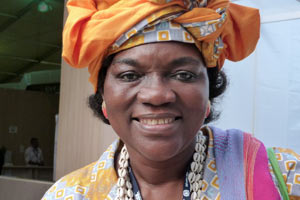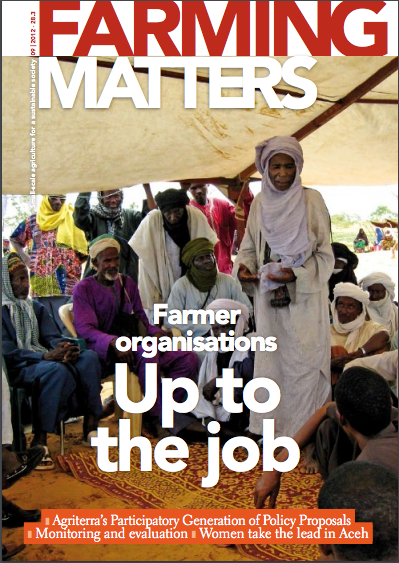Elisabeth Atangana – As a farmer, the newly appointed FAO Special Ambassador for Co-operatives, Elisabeth Atangana, is familiar with farmer organisations at many different levels.
She is president of the National Dialogue of Peasant Organisations (CNOP-CAM), in her native country, Cameroon, of the Subregional Platform of Peasant Organisations of Central Africa (PROPAC) and of the Pan-African Farmers’ Organisation (PAFO). She has played an active role in the creation and growth of these organisations.

In addition, she is one of the two co-ordinators of the More and Better Network, the African representative in the World Consultative Committee of the International Year of Family Farming, and she owns a banana, vegetable and pig farm 30 kilometres from Yaoundé, Cameroon’s capital.
Elisabeth Atangana is an active representative of African farmers in the international arena, at events like Rio+20. She voices farmers’ concerns, and returns home to inform farmers about global debates.
“Villagers then get to know about Rio+20,” she says. “We are organised like a pyramid, from the pan- African level to the local level. At the local level, we put our priorities together in a strategic plan. At a national level, for example in Cameroon, the national organisation (CNOP-CAM) gathers all its members to discuss these local priorities. Then the national strategic plans are discussed at a regional level, and the common priorities for each region are discussed in PAFO. As a result, all the issues discussed in PAFO are rooted in local level concerns. Of course, PAFO cannot solve every farming problem on the African continent, so we try to tackle only common continental issues. But these are all built on local realities.”
How do you work within a local level, a national, regional and a Pan-African level?
We started very small, at the level of the village, 35 years ago. Now we are at the Pan-African level. I still try to go to local meetings as much as I can. I believe it is important to keep this link, with communication channels going up and down. We bring back information from the regional and national levels back to local farmers’ organisations. We talk about the problems emerging from national and international trade agreements, for example, or about the need for more investments in agriculture. And then it is not always easy to find a common vision for an entire continent. Some countries, like South Africa, have many large farms, while West and Central African countries have a large number of small farms. Different systems of production mean different interests, and consolidating them into one voice is challenging. However, we try to manage this by using a democratic approach.
How did this start?
Traditionally, in Africa, we have a culture of solidarity. In Cameroon, small village level groups have always come together to collectively solve common issues such as water scarcity, or to jointly support production. These self-help groups were strengthened from within when the government stopped supporting small-scale production at the time of the Structural Adjustment Programmes. It was farmers who took the initiative, with the support of some NGOs and sometimes from the local authorities. When we realised that it is difficult for one group at the local level to discuss issues at a national level, many local leaders [including herself – ed.] came together and discussed creating an umbrella organisation that could speak to the government with one voice. Getting local organisations together also helped to compare local problems and solutions nationally and to start learning from each other in this way.
And it all grew from the local level to the pan-African level…
Our need for creating regional-level organisations in Africa grew after 2000, with the creation of NEPAD, the new food security agenda promoted by international institutions at that time and the development of the Economic Partnership Agreements (EPAs): the free trade agreements negotiated between the European Union and the African, Caribbean and Pacific (ACP) countries. These were big issues, and the needs of family farmers needed to be defended at an international level. With the support of IFAD and FAO, five regional African farmers’ organisations were formed. These organisations then decided to build a strong international organisation, which led to the establishment of PAFO. It was great to be part of this whole process.
What challenges did you encounter in this process?
Initially we did not have the funds to travel through the country to connect local leaders and identify existing organisations. We had to find resources for this locally. Only in 2000 were we able to get donor funding for the first National Farmers’ Organisation Forum. Another problem we encountered was a political one. Local elites feared that our involvement in their communities meant that we wanted political power. To prevent this from becoming a problem, we made sure when entering a village to meet up with the chiefs and start a dialogue, explaining to them that the purpose of creating self-help groups is not to gain political power, but to help farmers help themselves.
Do women and youth face specific challenges in these different levels of farmer organisations?
Including everyone is not simple. To be able to participate fully, women and young people need education and training so they can express their ideas or formulate their position. Therefore, it is very important that we strengthen the leadership capacities of women and youth. Secondly, we need to create a space for them to enter into dialogue with decision makers, because in this way they can confront the decision maker with the concerns and needs of the poorest segments of the population.
What role can farmer organisations play in opening these spaces for dialogue?
At a regional level, with PROPAC, we help to structure national organisations, and at a national level, with CNOP-CAM, we help to structure the local member organisations. We offer institutional support, help them mobilise resources and build leadership capacities – helping leaders engage in dialogue with communities. Which organisations we actually help depends on the demand. It is important that farmers themselves ask for support, after which we can help them to identify what training is necessary. Training of farmers is done at different levels. CNOPCAM trains farmers’ organisations in production methods, but also in the management of groups, lobbying, and in forming partnerships. My local organisation, a member of CNOP-CAM, has built training centres in Cameroon to train the youth. They alternate between the school and the farm: they come to school for one or two weeks, after which they return to the village to exchange ideas with the farmers. Now we have 75 young people trained not only as farmers, but also to be leaders for change. Young people are asking to change the way we see agriculture: they want to give agriculture an image of entrepreneurship and professionalism.
In CNOP-CAM, we also link member organisations with each other, as well as with other stakeholders such as NGOs, international organisations, government officials or local communities. We also started to create negotiation and advocacy spaces. We have the support of the More and Better Network, for example, for increasing dialogue, enhancing the capacities of farmers’ organisations, increasing the financing options and the investment possibilities in agriculture. As a farmers’ organisation, we establish collaboration with other sectors to open space for dialogue with decision makers. All stakeholders, including NGOs or the private sector, have a role to play.
Is there more space now for farmer organisations to engage in this dialogue?
Yes, definitely. In Africa, for example, we built the PAFO platform to be able to express a common voice. It is necessary to speak with a common voice to decision makers so that we can be understood and they can take our concerns seriously. By starting from the local collectivity, we increase farmers’ voices, including those of women and youth. This is seen in our programmes which, for example, reinforce the capacity of women to be able to participate in ongoing discussions about climate change, so that their needs can be taken into consideration by policy makers.
What local concerns did you try to bring up at Rio?
One of the main concerns that I brought to Rio+20 included the need to mobilise women and increase their autonomy: help them to access appropriate technologies and to manage their farms, soil and seeds. It is important that we teach women and youth, in a professional manner, how to conserve local and traditional seeds. Another issue that I wanted to highlight is that of land: we need to be able to secure and conserve land. I also believe that we should consider the capacity of the population to be more resilient to climate change. It is important to invest in family farmers, so that they can continue to ensure food security at a local level and at the same time increase their revenue and develop employment opportunities.
Do you feel that you have been heard?
I can say that there is some positive evolution. But more is needed. That is why we still have a job to do. It is important that investments in small-scale farmers’ organisations and family farming increase, so we can train more people and dialogue with government and decision makers. We also need specific financing tools, like local managed credit schemes, which can help farmers. Direct support to farmers is very important and is needed now. We grew from a local level to a Pan-African level: I see this as a very important evolution. We did not have support before; we managed it all by ourselves. But now we need support so we can increase our activities, supporting more people in an autonomous way. This is why we need the support of those who respect our vision. And our vision is sustainable agriculture.
You were appointed FAO’s Special Ambassador for Cooperatives. What do you hope to achieve in this role?
I hope for a greater recognition within the UN institutions of what farmer organisations are doing. I have proposed a plan of action, which I can describe in more detail once it has been approved. In general, I hope to promote co-operatives at different levels. I believe that co-operatives are important tools in terms of social, economic and environmental development.
You are actively involved in the campaign for the International Year of Family Farming. What role can farmer organisations play in this?
I have been part of the IYFF campaign from the beginning. Farmers’ organisations need to mobilise. They need to identify the needs of farmers: organise themselves or strengthen existing organisations to bring these issues together. Only then will they have the power to negotiate with governments. My hope is that the celebration of the IYFF will help more and more people recognise the role of family farmers. Family farmers need investment, training, capacity building, and resources, which can all help farmers to change their environment. We need to sensitise governments to the fact that more than 70% of the population is directly involved in farming and agriculture, and that farmers play a very important role in guarding a country’s food sovereignty and alleviating poverty.
Interview: Laura Eggens
PAFO is made up of five regional farmer organisations: the network of Farmers and Agricultural Producers’ Organisations of West Africa (ROPPA), the Southern African Confederation of Agricultural Unions (SACAU), the East African Farmers Federation (EAFF), the Maghrebian Farmers Union (UMAGRI) and the Sub-regional Platform of Farmers Organisations in Central Africa (PROPAC).

